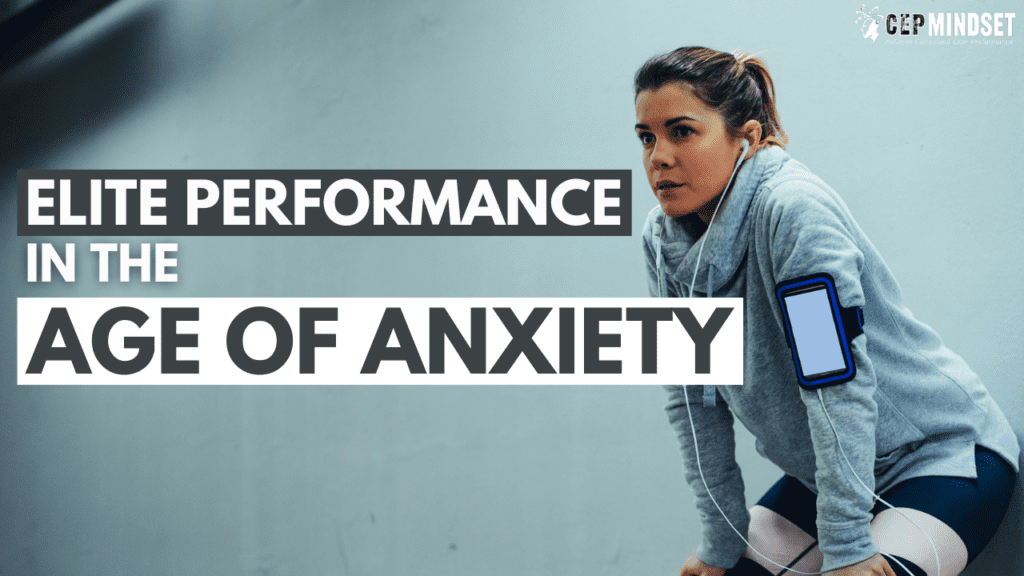
Disclaimer: This post was written by Coach Louie and is not meant to downplay anyone experiencing anxiety or offer any form of clinical advice. Rather, his intent is to share his opinions and offer perspectives that might help people and athletes in particular to better regulate their emotions. We hope you find it helpful.
___________________________________________________________________
Without looking too far you’ll hear the word anxiety mentioned. It’s become a buzz word in the mental health world. This psychological and physiological diagnosis is everywhere and we attach it to everything. It doesn’t seem too long ago when anxiety was rarely mentioned–if at all— and surprisingly people seemed less anxious. I have no doubt that anxiety exists, having experienced it myself – but has the rate of anxiety increased over the years? Or, have we looped too many thoughts and feelings under the umbrella of anxiety? Is there too much attention on the topic?
In the mental health world it is always safer to go the route of over expressing how you feel versus keeping things inside. It’s more common these days for children and adults alike to express how they feel and find solutions or coping mechanisms to help. I write with the utmost concern for those who need to express their feelings and thoughts – myself included – but have we come to a point where thoughts of anxiety are worse than thoughts that created it? It’s not uncommon to see people with anxiety and not remember what caused it. In a good way, we have become more aware of our thoughts and feelings which can help us identify, categorize and process them, but has this practice oversensitized us to the point it does more harm than good?
Some have become obsessed with the notion of anxiety that they are constantly looking for what could trigger those symptoms, which creates more anxiety and off we go on this vicious loop. A lot of what we call anxiety today used to be called life. The French used the phrase “C’est la Vie” (this is life), which encompasses life as an experience as opposed to something we can always control. We are now more secure about our future than ever before. If you’re reading this, you probably aren’t concerned about your next meal or a roof over your head. Nonetheless we find ourselves unsatisfied. We may be physically secure, but it’s not enough – we demand to know our future. With all the anxiety labeling, we have forgotten that insecurity is a part of life. There will never come a time when you’re completely secure, and if you think so, just think a little more. No matter how well things are going, one can always feel the anxiousness of the unknown or ponder our inevitable death.
As a human being you are not obliged to think about everything, no one has died or gone to jail because they refused to go down a path of anxious thinking. Our thinking minds are incredible tools but, like a skill saw, you best be in control during operation. Just because we think doesn’t mean we have to, or just because we have a thought doesn’t mean we have to entertain it. We can look at the thought, accept it and move on.
Anxiety in Sport
As anxiety becomes increasingly prevalent in society, athletes are not immune to its reach. Athletic performance already packs with it the pressure to perform at peak levels, coupled with the scrutiny of spectators, coaches, and media.
The heightened focus on anxiety has, at times, led athletes to overanalyze their feelings and thoughts, potentially labeling normal fluctuations in emotions as anxiety-inducing. The quest to identify triggers and cope with anxiety can become consuming for athletes, distracting them from their training and competition preparation. This cycle of self-monitoring and anxiety can create a negative feedback loop, where the fear of anxiety itself becomes a significant source of stress.
Reframing Anxiety for Athletes
Strike a Balance
It’s crucial for athletes to strike a balance between acknowledging their emotions and not letting every passing thought dictate their mindset. Awareness is indeed important – being in tune with one’s mental state can enhance self-awareness and performance. However, athletes must also develop a mindset that doesn’t give undue respect or power to every thought that arises.
At CEP we call negative thoughts and feelings the “Pink Elephant”. When an athlete is told to not think of a pink elephant the first thing they think about is a Pink Elephant. This is exactly what is happening with the common advice such as: “don’t worry about it” and “don’t think about it” — it’s trying to remove the negative thoughts and feelings — which does NOT work.
Instead, we teach our athletes how to process the unwanted thoughts and emotions (the Pink Elephants) so they can accept and let them go. The sooner they learn to face it and embrace it, then the quicker they focus back on the game and enjoy their sport.
Practical Advice to Avoid Unnecessary Anxiety
Who do you spend time with?
Athletes spend a considerable amount of time with teammates, coaches, support staff, and even fans. The attitudes and behaviors of these individuals can influence how athletes perceive and manage their own emotions. Athletes are particularly susceptible to the social influence of their peers. If teammates or close friends frequently discuss their own anxious thoughts and feelings, it can normalize anxiety as a common experience. While it’s important to support teammates through their struggles, constant focus on anxiety can create an environment where anxiety is perceived as more prevalent or severe than it may actually be.
Tip: Surround yourself with individuals who radiate joy and light-heartedness rather than those who constantly dwell on their negative thoughts and feelings by labeling themselves as anxious. Spending time with overly concerned individuals can inadvertently lead you to adopt similar thought patterns and emotions.
Reduce Your Social Media Time
Social media platforms often amplify discussions around anxiety, making it appear more widespread and severe than it may actually be. Athletes scrolling through feeds saturated with anxiety-related content may start to perceive anxiety as a more common and insurmountable issue than it truly is. Scrolling through anxiety-related content can create a cycle where being exposed to anxious thoughts and feelings reinforces them in your own mind. This can make anxiety symptoms worse and make it hard to break free from anxious thinking.
Tip: Set boundaries around social media use and prioritize platforms that promote positive content and discussions relevant to their interests outside of anxiety.
Deciphering Anxiety Symptoms vs Anxiety Diagnosis
No one can avoid anxious thoughts and feelings — this is part of being human. The deeper challenge arises when we self diagnose ourselves with anxiety due to these thoughts. Once someone labels themselves as “I am someone with anxiety,” this can create a self-perpetuating problem. They expect to feel anxious, then they feel anxious, and because they identify that “this is just who they are” they stay anxious.
On the other hand, feeling anxious is a natural emotional response to stress, uncertainty, or perceived threats in daily life. When faced with an important event or challenge, the uncertainty of the outcome can create worry and feelings of anxiousness. But this can even be beneficial, as it can motivate individuals to prepare for challenges and perform effectively. We get a jolt of energy because we care — but how you frame and use that energy is up to the individual.
Tip: The next time you notice yourself experiencing anxious thoughts and feelings, recognize that feelings of anxiousness can serve a purpose – they can motivate you to prepare for challenges or prompt you to make necessary changes in your life. By reframing anxiety as a natural response rather than a definitive diagnosis, you empower yourself to manage these feelings more effectively.
Conclusion
While understanding and managing anxiety is crucial for our well-being, it’s equally important to not let the label of anxiety define or weaken our response to life’s challenges. By cultivating a healthy approach to our thoughts and emotions, we can strive for a more balanced and fulfilling existence, where anxiety is understood as a part of life rather than a defining diagnosis. I suggest we reconsider how we discuss and frame anxiety in our daily conversations and societal narratives – or if possible, stop talking about it all together.

 Nicholas is a Senior High-Performance Coach and holds a doctorate in Sport & Exercise Psychology. From his specialized psychology research program, to his PhD studies, Nicholas has gained a tremendous foundation of knowledge and appreciation for the human experience. His passion for psychology has accumulated to a commitment to studying and applying performance psychology and stoicism. This commitment has led Nicholas to conduct many research studies focusing on understanding why and how some people thrive and prosper while others do not. His admiration for evidence-based solutions has propelled Nicholas to produce studies revolving around mindfulness, grit (perseverance and passion), performance, quality participation, social relationships, and well-being.
Nicholas is a Senior High-Performance Coach and holds a doctorate in Sport & Exercise Psychology. From his specialized psychology research program, to his PhD studies, Nicholas has gained a tremendous foundation of knowledge and appreciation for the human experience. His passion for psychology has accumulated to a commitment to studying and applying performance psychology and stoicism. This commitment has led Nicholas to conduct many research studies focusing on understanding why and how some people thrive and prosper while others do not. His admiration for evidence-based solutions has propelled Nicholas to produce studies revolving around mindfulness, grit (perseverance and passion), performance, quality participation, social relationships, and well-being. A Native of Quebec, Sara was part of the St. Lawrence University Women’s Ice Hockey team that competed in the NCAA Division 1 hockey league ECAC. During this time, Sara helped her team appear in four ECAC Hockey Tournaments and two NCAA Frozen Fours, and was a four-time member of the ECAC Hockey All-Academic Squad. Following her career at St. Lawrence University, Sara played one year of professional hockey with Lugano, where she truly honed her skills in understanding the intricate connection between mindset and performance.
A Native of Quebec, Sara was part of the St. Lawrence University Women’s Ice Hockey team that competed in the NCAA Division 1 hockey league ECAC. During this time, Sara helped her team appear in four ECAC Hockey Tournaments and two NCAA Frozen Fours, and was a four-time member of the ECAC Hockey All-Academic Squad. Following her career at St. Lawrence University, Sara played one year of professional hockey with Lugano, where she truly honed her skills in understanding the intricate connection between mindset and performance.
 Blair has over 13 years of experience as a Professional Dancer, Assistant Dance Captain & Cast Manager, as well as an additional 17 years of training. Over the last 3 decades, she has lived and experienced first hand the highest of highs & lowest of lows that come with pursuing a career in the Performing Arts.
Blair has over 13 years of experience as a Professional Dancer, Assistant Dance Captain & Cast Manager, as well as an additional 17 years of training. Over the last 3 decades, she has lived and experienced first hand the highest of highs & lowest of lows that come with pursuing a career in the Performing Arts.

 Natasha Habert draws from her training in sport and performance psychology, personal experiences as a competitive athlete, and deep passion for consistent high performance. She is a lifelong athlete and high performer, excelling in volleyball as both a player and coach.
Natasha Habert draws from her training in sport and performance psychology, personal experiences as a competitive athlete, and deep passion for consistent high performance. She is a lifelong athlete and high performer, excelling in volleyball as both a player and coach. Luciano’s hockey career is highlighted by his time playing college at the University of Victoria and two professional seasons in Europe. Throughout his career, he struggled with performance anxiety, a lack of consistency, fluctuations in confidence, and being caught in the results trap. This eventually led him to deviate from the main reason why anyone should play sports – for the enjoyment of the game. As a former athlete, Luciano has a unique understanding of the psychological pressures and struggles that athletes experience.
Luciano’s hockey career is highlighted by his time playing college at the University of Victoria and two professional seasons in Europe. Throughout his career, he struggled with performance anxiety, a lack of consistency, fluctuations in confidence, and being caught in the results trap. This eventually led him to deviate from the main reason why anyone should play sports – for the enjoyment of the game. As a former athlete, Luciano has a unique understanding of the psychological pressures and struggles that athletes experience. Alexis Woloschuk is a name synonymous with mental fortitude in the world of professional hockey. Throughout her career originating playing boys hockey, going to an academy away from home, playing her four years at Boston University and 7+ years in pro hockey she’s learned the importance of resilience, confidence, and dismissing both fear and other’s opinions. With a blend of relatability, confidence, and an acute understanding of playing to one’s potential, Alexis helps athletes reshape the way they perceive and harness the power of their minds.
Alexis Woloschuk is a name synonymous with mental fortitude in the world of professional hockey. Throughout her career originating playing boys hockey, going to an academy away from home, playing her four years at Boston University and 7+ years in pro hockey she’s learned the importance of resilience, confidence, and dismissing both fear and other’s opinions. With a blend of relatability, confidence, and an acute understanding of playing to one’s potential, Alexis helps athletes reshape the way they perceive and harness the power of their minds. Sean Mahoney is a member of the Association for Applied Sport Psychology (AASP), and a Master’s candidate in the Sport and Performance Psychology program at the University of Denver. For as long as he can remember, Sean has been fascinated by human performance and how to gain an edge over the competition. For most of his athletic career, he focused on the physical aspect of performance but neglected the mental. Because of this, he struggled with performance anxiety, focus issues, and limiting beliefs pertaining to confidence and self-doubt. His lack of focus on optimizing his mental game prevented him from reaching his full potential.
Sean Mahoney is a member of the Association for Applied Sport Psychology (AASP), and a Master’s candidate in the Sport and Performance Psychology program at the University of Denver. For as long as he can remember, Sean has been fascinated by human performance and how to gain an edge over the competition. For most of his athletic career, he focused on the physical aspect of performance but neglected the mental. Because of this, he struggled with performance anxiety, focus issues, and limiting beliefs pertaining to confidence and self-doubt. His lack of focus on optimizing his mental game prevented him from reaching his full potential. Savannah Fitzgerald is earning her M.A. in Kinesiology, Sport Psychology Option at California State University, Fresno. Possessing an internal motor that fires her rage for success, Savannah forged this attribute over five years while competing as an NCAA D-I water polo player and swimmer. Combined with her opportunity to represent and compete for the United States, she feels that sport has significantly impacted her professional development. Due to her personal experience playing at all levels, Savannah’s passion for mental performance began when she struggled to overcome pre-competition nerves and post-competition processing. When she discovered a world out there that people were referring to as ‘sport psychology,’ she felt like a piece of her brain was unlocked. Reality shifted as she stumbled into a space consisting of the most beautiful blend of elite performance, mental well-being, and athletics.
Savannah Fitzgerald is earning her M.A. in Kinesiology, Sport Psychology Option at California State University, Fresno. Possessing an internal motor that fires her rage for success, Savannah forged this attribute over five years while competing as an NCAA D-I water polo player and swimmer. Combined with her opportunity to represent and compete for the United States, she feels that sport has significantly impacted her professional development. Due to her personal experience playing at all levels, Savannah’s passion for mental performance began when she struggled to overcome pre-competition nerves and post-competition processing. When she discovered a world out there that people were referring to as ‘sport psychology,’ she felt like a piece of her brain was unlocked. Reality shifted as she stumbled into a space consisting of the most beautiful blend of elite performance, mental well-being, and athletics. Gabe is currently completing his Master’s in Counselling Psychology at the University of Victoria. Although Gabe played several years of high-level baseball, including a stint in the British Columbia Premier Baseball League (BCPBL), he chose hockey as his sport to pursue at the highest level possible. Gabe went on to play four years of junior hockey with the Richmond Sockeyes in the Pacific Junior Hockey League (PJHL) while also coaching minor hockey. Prior to junior hockey, Gabe played 3 years in the Canadian Sport School Hockey League (CSSHL) where he experienced the pressures and expectations of moving on to the next level. During those three years, Gabe constantly compared himself to others and struggled with coping when things did not go his way. Over time, he learned how to focus on his own process and path to the next level, while also developing strategies to improve well-being.
Gabe is currently completing his Master’s in Counselling Psychology at the University of Victoria. Although Gabe played several years of high-level baseball, including a stint in the British Columbia Premier Baseball League (BCPBL), he chose hockey as his sport to pursue at the highest level possible. Gabe went on to play four years of junior hockey with the Richmond Sockeyes in the Pacific Junior Hockey League (PJHL) while also coaching minor hockey. Prior to junior hockey, Gabe played 3 years in the Canadian Sport School Hockey League (CSSHL) where he experienced the pressures and expectations of moving on to the next level. During those three years, Gabe constantly compared himself to others and struggled with coping when things did not go his way. Over time, he learned how to focus on his own process and path to the next level, while also developing strategies to improve well-being. Louie is a mental performance coach from Toronto, Canada with a professional hockey career spanning over 14 years. Being a standout player at the University of Michigan, Louie was a Hobey Baker finalist and a 1st team All-American, which led him to getting drafted by the Ottawa Senators and playing in renowned leagues across the globe, including the DEL, SHL, and AHL.
Louie is a mental performance coach from Toronto, Canada with a professional hockey career spanning over 14 years. Being a standout player at the University of Michigan, Louie was a Hobey Baker finalist and a 1st team All-American, which led him to getting drafted by the Ottawa Senators and playing in renowned leagues across the globe, including the DEL, SHL, and AHL.
 Mia Landry is a former varsity hockey player at Brock University, where she competed at the USPORT level and was part of the 2021-22 OUA gold medal team. Mia currently represents Canada on the Women’s National Ball Hockey team and is pursuing a Master of Kinesiology Sport Psychology at her alma mater. Her research focuses on areas such as team cohesion, group dynamics, leadership styles, and sports culture.
Mia Landry is a former varsity hockey player at Brock University, where she competed at the USPORT level and was part of the 2021-22 OUA gold medal team. Mia currently represents Canada on the Women’s National Ball Hockey team and is pursuing a Master of Kinesiology Sport Psychology at her alma mater. Her research focuses on areas such as team cohesion, group dynamics, leadership styles, and sports culture. As a former member of McMaster University’s women’s soccer team, Emilie intimately understands the demands and challenges athletes face on and off the field. Although she encountered many challenges as a high-level athlete, particularly struggling with self-doubt and overthinking, Emilie was able to make a remarkable transformation when she began to embrace the principles of sports psychology.
As a former member of McMaster University’s women’s soccer team, Emilie intimately understands the demands and challenges athletes face on and off the field. Although she encountered many challenges as a high-level athlete, particularly struggling with self-doubt and overthinking, Emilie was able to make a remarkable transformation when she began to embrace the principles of sports psychology. Max is currently attending William James College, where he is earning a Doctorate Degree in Clinical Psychology and a Masters Degree in Professional Psychology. During his time as an undergraduate student, Max was inducted into the International Honor Society in Psychology (Psi Chi), and played on the Quinnipiac University men’s club ice hockey team.
Max is currently attending William James College, where he is earning a Doctorate Degree in Clinical Psychology and a Masters Degree in Professional Psychology. During his time as an undergraduate student, Max was inducted into the International Honor Society in Psychology (Psi Chi), and played on the Quinnipiac University men’s club ice hockey team.







